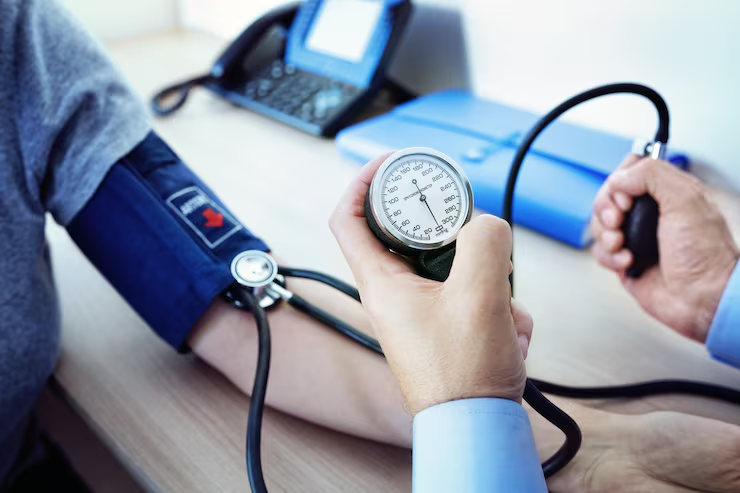Blood Pressure
Blood Pressure Doctor in indore
Blood pressure is a vital measure of cardiovascular health, representing the force of blood pushing against artery walls as the heart pumps. It’s measured in millimeters of mercury (mmHg) and consists of two numbers: systolic pressure, which is the force when the heart beats, and diastolic pressure, the force when the heart is at rest between beats. Understanding your blood pressure numbers is crucial for maintaining overall health and preventing cardiovascular diseases.

BLOOD PRESSURE DOCTOR NEAR YOU
Types Of Blood Pressure
Blood pressure is categorized into several types based on the readings.
Normal blood pressure
It is below 120/80 mmHg. Elevated blood pressure ranges from 120-129 for systolic and less than 80 for diastolic.
Hypertension Stage 1
It is diagnosed when readings consistently show 130-139 systolic or 80-89 diastolic.
Hypertension Stage 2
It is more severe, with readings of 140/90 mmHg or higher.
“A hypertensive crisis, requiring immediate medical attention, occurs when blood pressure surpasses 180/120 mmHg”.
How To Control Blood Pressure
Controlling blood pressure involves a multifaceted approach. Regular check-ups with a blood pressure specialist doctor in indore are essential for monitoring and adjusting treatment plans. Medication, as prescribed by your best doctor for blood pressure in Mahalaxmi Nagar , may be necessary to manage hypertension effectively. Lifestyle modifications play a crucial role, including:
- Stress management techniques,
- Maintaining a healthy weight
- Limiting alcohol consumption
- Quitting smoking.
These strategies, combined with medical supervision, can significantly improve blood pressure contro
Preventive Steps
Prevention is key in managing blood pressure. Regular home monitoring and annual check-ups with a cardiologist in Indore can help detect and address issues early. Adopting a heart-healthy diet, rich in fruits, vegetables, and whole grains, while low in sodium and saturated fats, is crucial. Staying physically active, managing stress through relaxation techniques, and maintaining a healthy BMI are all important preventive measures. By incorporating these steps into daily life, individuals can significantly reduce their risk of developing hypertension.

Safe Food For Blood Pressure Control
A diet rich in certain foods can naturally help control blood pressure. Leafy green vegetables, berries (especially blueberries), beetroot, and fatty fish like salmon are excellent choices. Whole grains, low-fat dairy products, nuts, and seeds also contribute to heart health. Garlic and herbs not only add flavor but can have beneficial effects on blood pressure. For proper guidance, consulting a hypertension specialist in Nipania, Indore can help you combine a healthy diet with the right medical advice for effective blood pressure management.
Food to Avoid
Certain foods can negatively impact blood pressure and should be limited or avoided. Processed and packaged foods high in sodium are particularly problematic. Excessive caffeine and alcohol consumption can also raise blood pressure. Red meat, sugary foods and beverages, and foods high in trans fats and saturated fats should be consumed in moderation. High-cholesterol foods can contribute to arterial plaque buildup, indirectly affecting blood pressure. Being mindful of these dietary choices is crucial for maintaining healthy blood pressure levels.
Habits to Avoid
Lifestyle habits play a significant role in blood pressure management. A sedentary lifestyle, smoking, and excessive alcohol consumption are major risk factors for hypertension. High-stress situations without proper management techniques can lead to temporary spikes in blood pressure, which over time can contribute to chronic hypertension. Skipping regular check-ups and ignoring prescribed medications can lead to uncontrolled blood pressure. Inconsistent sleep patterns can also negatively affect blood pressure regulation. Addressing these habits is essential for effective blood pressure control.
Importance of Regular Fitness
Regular physical activity is a cornerstone of blood pressure management. Aim for at least 150 minutes of moderate-intensity exercise per week, incorporating a mix of cardio and strength training exercises. Starting with low-impact activities like walking or swimming and gradually increasing intensity and duration is a safe approach. For personalized guidance, consulting a blood pressure doctor in Nipania, Indore can help you combine exercise with proper medical advice for effective and long-term blood pressure control. Consider joining fitness classes or working with a personal trainer to ensure proper form and motivation. Using fitness apps or wearable devices can help track progress and maintain consistency. Making physical activity a daily habit is crucial for overall cardiovascular health.
Managing Related Health Concerns
High blood pressure often coexists with other health conditions, requiring a multidisciplinary approach for comprehensive care. Sleep apnea, a condition where breathing repeatedly stops and starts during sleep, can significantly contribute to high blood pressure. If you experience symptoms like loud snoring, gasping for air during sleep, or excessive daytime sleepiness, it’s crucial to undergo a sleep study and seek appropriate treatment.
Effective diabetes management is also essential in reducing cardiovascular risk for individuals with hypertension. Diabetes and high blood pressure often go hand in hand, with each condition exacerbating the other. Regular blood sugar monitoring, maintaining a healthy diet, exercising regularly, and adhering to prescribed medications are key components of managing both conditions simultaneously.
Additionally, it’s important to be aware of the potential impact of certain medications on blood pressure. Some over-the-counter pain relievers, decongestants, and prescription drugs can raise blood pressure. Always consult with your blood pressure specialist doctor before starting any new medication, and inform all your healthcare providers about your hypertension to ensure coordinated and safe treatment across all aspects of your health.
Amenities
Medical science is a field that deals with the diagnosis.
Qualified Doctors
Emergency Help
Modern Equipment
Faqs About Blood Pressure
Causes include stress, poor diet, lack of exercise, obesity, and genetics.
Avoid salty, processed, fried, and sugary foods.
Often no symptoms, but severe cases may cause headaches, dizziness, or vision problems.
Yes, stress can temporarily raise blood pressure.
Visit physicianarchanarathi.com to schedule an appointment with a trusted blood pressure specialist near me and take control of your heart health today.


